December 1, 2025 | 09:18 GMT +7
December 1, 2025 | 09:18 GMT +7
Hotline: 0913.378.918
December 1, 2025 | 09:18 GMT +7
Hotline: 0913.378.918
Con Dao is renowned as a sacred island and an ecotourism paradise in Ba Ria – Vung Tau province. However, strong tourism development has placed a strain on this island. Each day, approximately 25–27 tons of domestic waste are generated, with nearly 16% of this waste being plastic. The district's main landfill, which has been in operation since 1985, has already accumulated nearly 100,000 tons of waste, rendering it unable to accept any further waste.
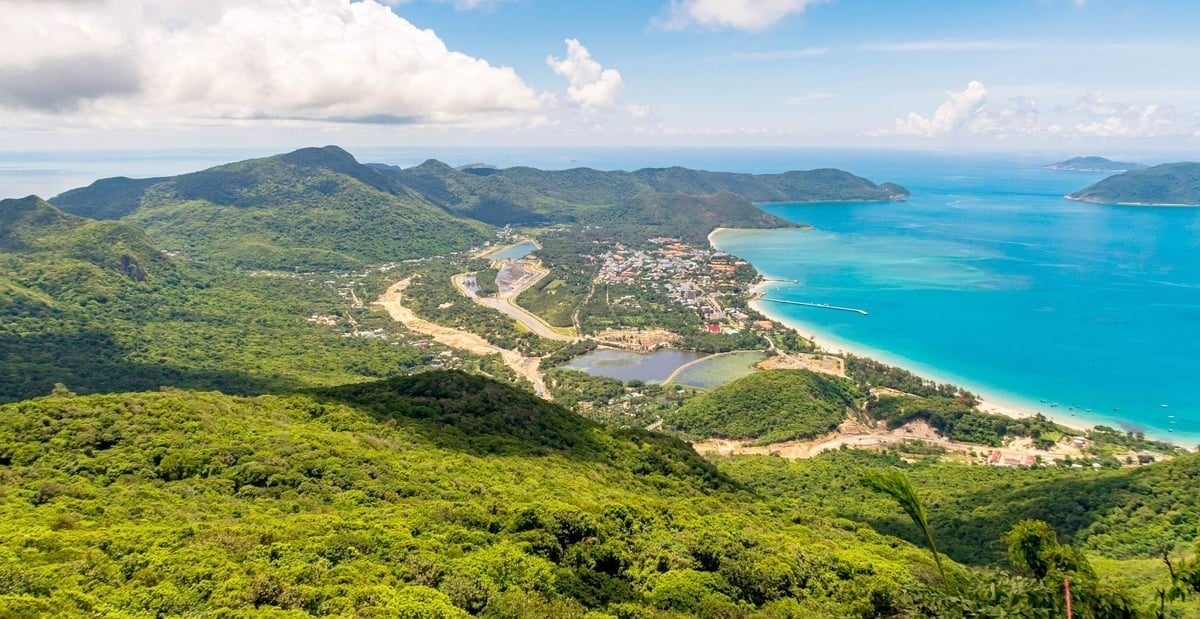
Con Dao has been likened to a priceless gem in the vast blue sea, holding great potential for tourism development and biodiversity conservation. Photo: Le Binh.
Mr. Tran Thanh Huyen, Vice Chairman of the Con Dao District People's Committee, acknowledged that the island is facing not only land-based waste but also persistent challenges from marine debris. “Monsoon winds or strong ocean currents bring in tons of ghost nets, plastic bags, and industrial plastics that wash ashore onto beaches and mangrove forests that were once ideal habitats for many rare and endangered species,” Mr. Huyen said.
A survey by the World Wide Fund for Nature (WWF) found that on average, every meter of coastline in Con Dao contains 62 plastic items and 13 kilograms of plastic waste, the highest level among all 11 marine protected areas nationwide. Faced with this situation, in June 2022, the Con Dao District People's Committee partnered with the “Reducing Ocean Plastic Waste in Vietnam” project (WWF) to address the problem.
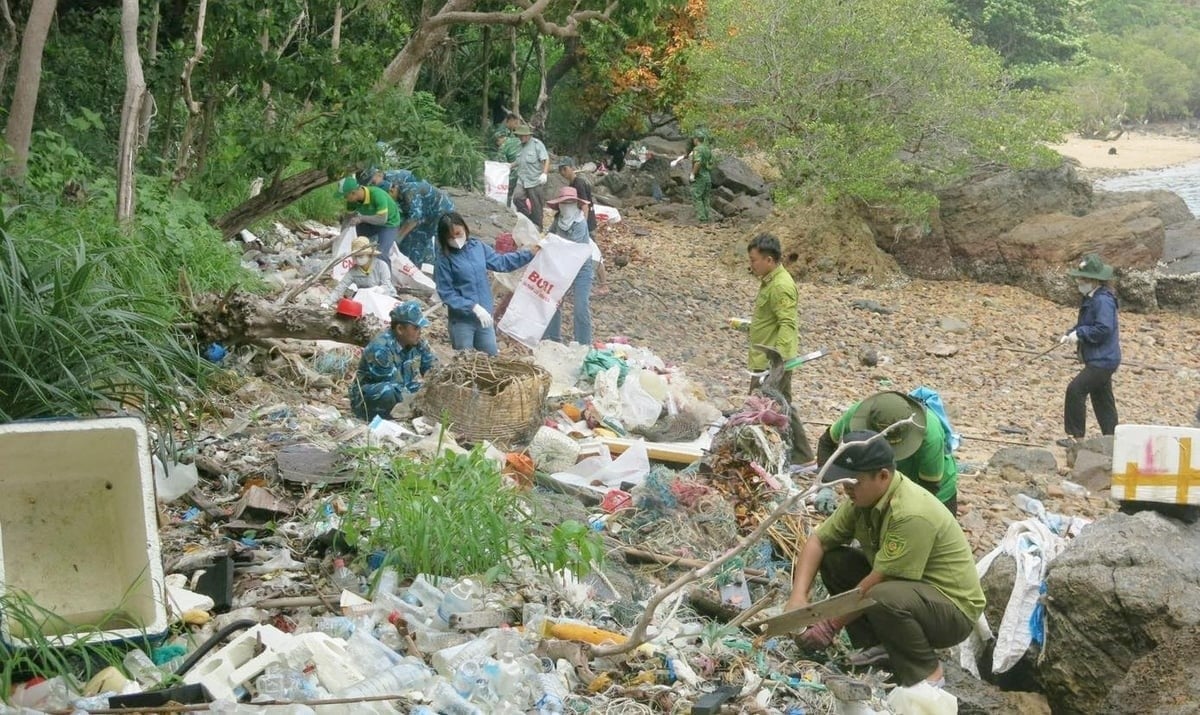
Plastic waste has become a serious issue in this island district, threatening development across all sectors. Photo: Huy Pham.
The commitment program is being implemented through actions such as perfecting the management mechanism for domestic and plastic waste. At the same time, Con Dao also reduces waste generation, sorts solid domestic waste, and cuts plastic waste at the source by 5–10%. The rate of use and recycling at the source also increases by 1%, and efforts are underway to reduce plastic leakage into the environment by approximately 8 tons per year. The most crucial action is raising public awareness and mobilizing all sectors of society in cleaning up the sea, coral reefs, and mangrove forests through ocean plastic waste monitoring and collection activities.
By 2023, Con Dao district had launched the “Research and Application of the Circular Economy Model for Sustainable Socio-Economic Development” project, comprising 30 key tasks with a total investment of over VND 765 billion (approx. USD 32 million). After two years, 20 of these tasks have been completed, with many of them becoming standard models.
The most notable initiative is the integration of circular economy thinking into the school system. All schools across the district have organized activities such as Green Club, Recycling Competition, and Plastic-Free Canteen. Students are taught how to sort waste, recycle, and reduce their consumption of single-use plastics. The district’s Women’s Union has recycled over 400 m² of old panels into more than 400 handbags for its members. The Youth Union has launched a "trash-for-gifts" exchange program for students. Meanwhile, the Fatherland Front has greened dumping grounds using an ‘herbal medicine garden’ model.
At both the night market and the central market of Con Dao, over 95% of small traders have stopped using non-biodegradable plastic bags. Community events and festivals are organized in accordance with the “5 No’s” principle: no votive paper, no styrofoam, no plastic bags, no plastic bottles, and no single-use plastic trays.
Plastic bags, once found in every corner of the green island, have now been replaced by fabric bags and banana leaves. Starting January 1, 2025, they will no longer be allowed at sacred sites, such as the Hang Duong Cemetery—a cultural landmark marking the community’s journey toward a greener lifestyle.
Every morning, locals along the Con Dao coastline gather to pick up trash. The plastic bags once buried in the sand are gradually disappearing. On the island, waste is no longer seen as a burden but is something that can be revived, recycled, and transformed into a new way of life.
With a goal of sustainable tourism development, Con Dao has become one of the few localities nationwide to implement a comprehensive “waste-free tourism” model. All accommodation establishments and tour operators have signed commitments to reduce and eliminate single-use plastic products.
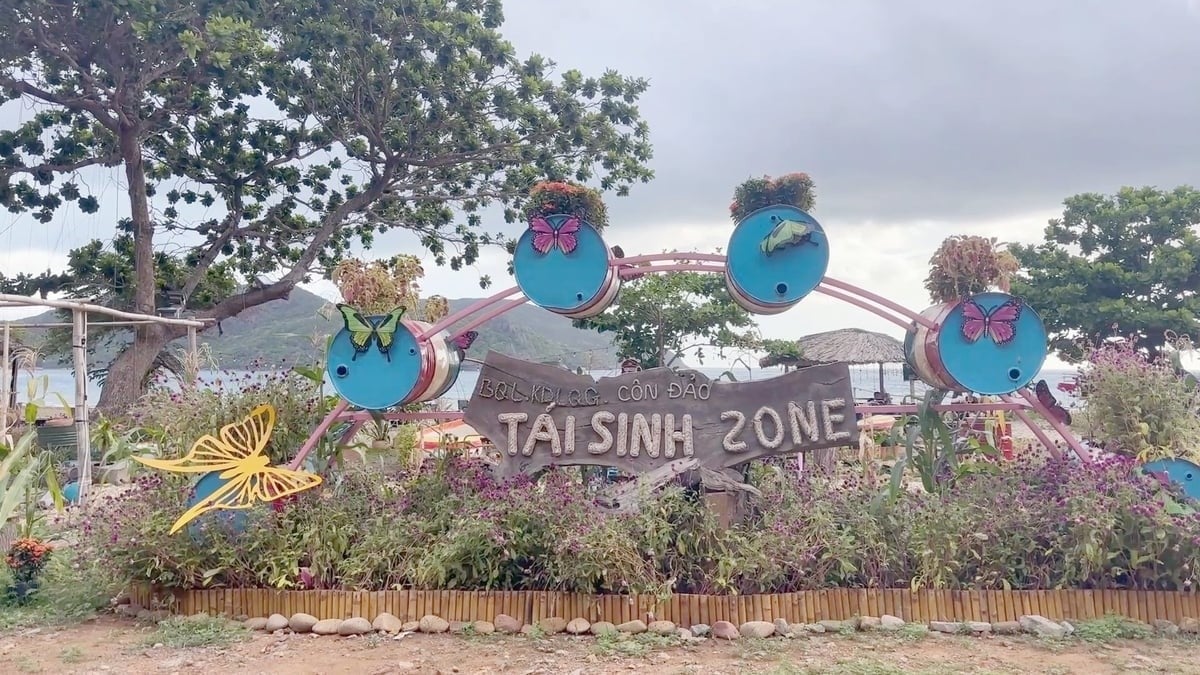
Tourist sites and tourism activities in Con Dao are closely aligned with a shared goal of recycling and reducing plastic waste. Photo: Le Binh.
According to Mr. Nguyen Van Da, Director of the Ba Ria-Vung Tau Department of Agriculture and Environment, the provincial People's Committee does not regard Con Dao as a pilot site but rather as a model. “Con Dao is the province’s typical locality in biodiversity conservation and circular economy. This is a pioneering locality where green policies are vigorously and properly realized, with proven results from practices,” emphasized Mr. Da.
The Director also affirmed, “The close coordination between local government, unions, businesses, and residents is key to this success. Without such a synchronous engagement, it would be extremely difficult to realize a ‘waste-free’ Con Dao.”
Every ferry ticket to Con Dao comes with a message: passengers do not bring plastic waste to the island. This message reflects the awareness and determination of both the local government and residents in saying no to plastic waste. Moreover, tourists will encounter the “plastic reduction” message displayed across roads and tourist destinations throughout the island.
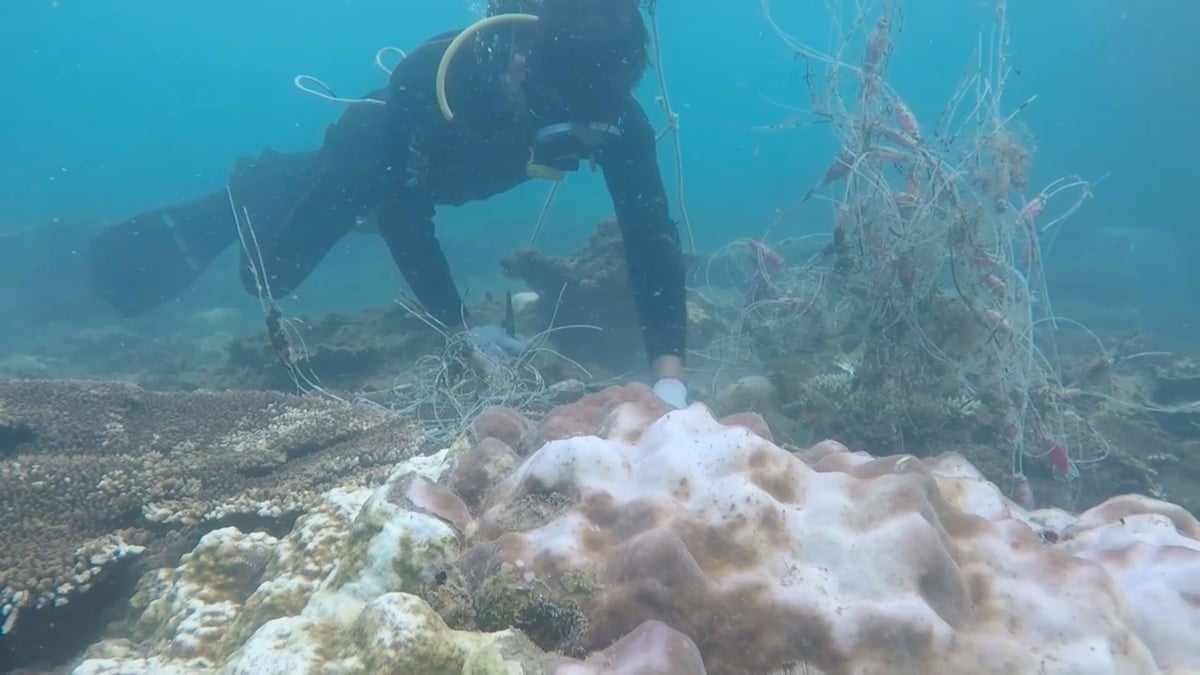
Specialized forces collect ghost nets trapped under coral reefs. Photo: Con Dao National Park.
At many hotels, the RO water filtration system has been installed to replace bottled water. Personal belongings are packaged in paper. Tourists are provided with green tourism handbooks and encouraged to bring their own water bottles and use environmentally friendly products.
The campaign “Fly Light to Con Dao,” organized by the District People's Committee in collaboration with Vietnam Airlines, has collected over 1,500 kilograms of recyclable waste, which has been recycled into public benches. More than 2,000 students, teachers, and tourists have been directly disseminated on plastic reduction and circular economy.
In addition to coastal litter collection, the district has coordinated with Con Dao National Park to salvage more than 10 tons of debris trapped under coral reefs, mainly ghost nets and industrial plastics. These ghost nets under coral reefs act like dead hands. Nearly 1,000 m³ of marine debris has been collected from beaches and mangrove forests. These efforts not only improve tourists’ perception of the marine environment but also protect the ecosystem from habitat threats.
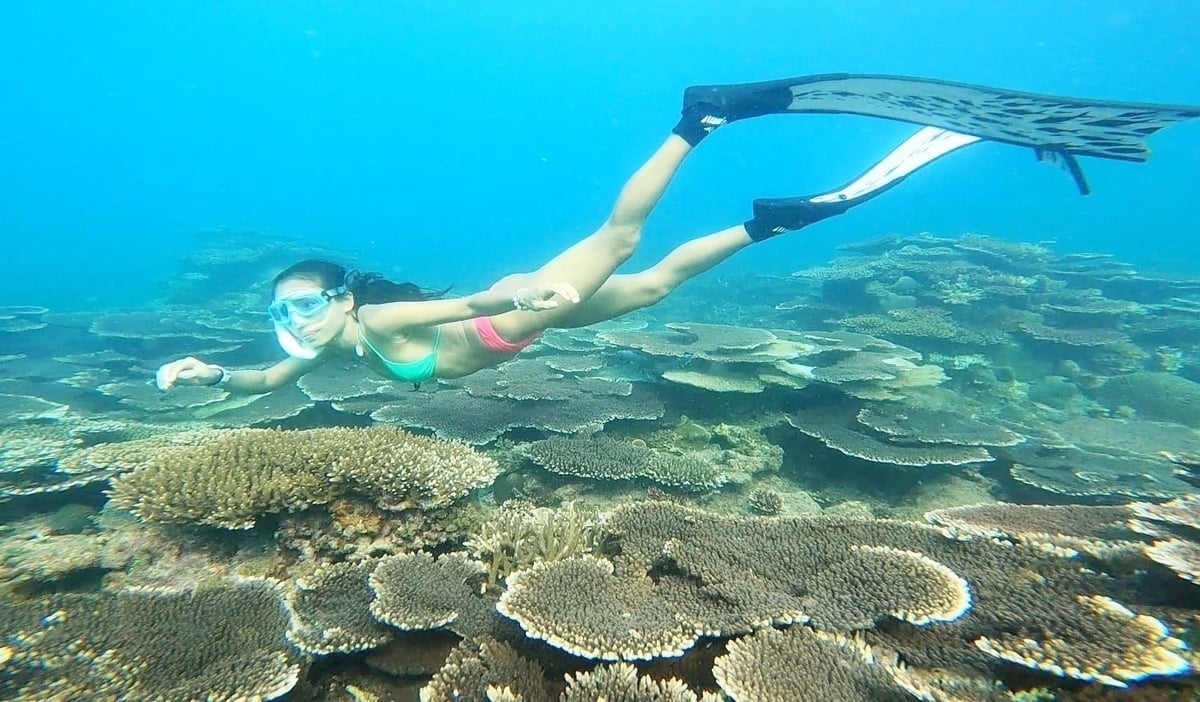
The Con Dao Sea is being restored to its original state after a long term of “forcing to commit suicide” by marine debris. Photo: Le Ba Thanh.
Mr. Nguyen Duc Toan, Director General of the Viet Nam Agency of Seas and Islands under the Ministry of Agriculture and Environment, said, “Con Dao is a vivid example of island and marine governance based on the circular economy model. Here, initiatives not only reduce waste but also contribute to ecosystem restoration, which is rarely accomplished by other localities.”
The journey to reduce plastic waste in Con Dao is still long but is moving in the right direction. Con Dao still faces numerous challenges, including the lack of modern waste treatment factories, incomplete green finance mechanisms, and limited specialized human resources. However, rather than waiting, the locality has chosen to take action, gradually changing awareness, behaviors, and infrastructure.
From a small island district with a population under 10,000, Con Dao is emerging as a symbol of sustainable development, not only for Ba Ria-Vung Tau province but also for coastal and island localities nationwide.
A green and clean island is no longer a prospect. For Con Dao, it is becoming a reality built from persistent daily actions.
Translated by Thu Huyen

(VAN) The inevitable path forward is to reorganize production along the value chain, utilizing cooperatives as the core, enterprises as the driving force, and farmers as the central subjects.

(VAN) On November 28, Minister Tran Duc Thang, together with China's Minister of Agriculture and Rural Affairs Han Jun, chaired the 2nd meeting of the Viet Nam - China Agricultural Cooperation Committee.

(VAN) Forest carbon credits are only accepted when they ensure absolute environmental integrity, additionality, permanence, and transparency.

(VAN) Viet Nam partners with Beijing on controlling air pollution, cross-regional management, high-tech monitoring and relocating polluting facilities.

(VAN) With a USD 50 million investment, Australia is partnering with Viet Nam to operate its first public electric bus fleet and develop a nationwide EV charging network.

(VAN) On November 28, in Beijing, Minister Tran Duc Thang met Minister of Ecology and Environment of China Huang Runqiu, to share experience on environmental protection.
/2025/11/28/0950-2-120557_751.jpg)
(VAN) The recent flood spell in the South Central region clearly reflects the characteristics of natural disasters in 2025, which are compound, prolonged, and amplified.